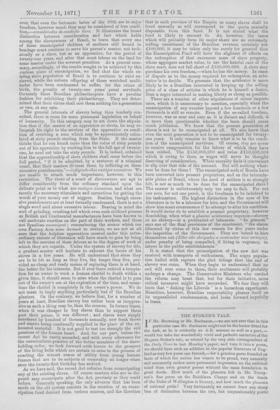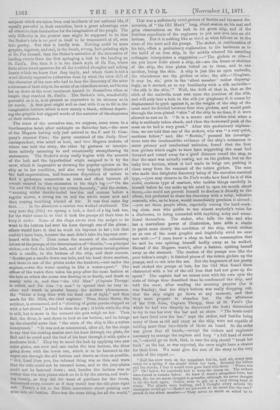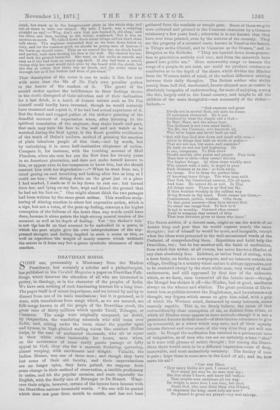THE STOKER'S TALE.
Ir Mr. Browning or Mr. Buchanan,—we are not sure that in thiss particular case Mr. Buchanan might not be the better fitted for the task, as he is evidently an A.B. seaman as well as a poet,— would but take the wonderfully vivid and pathetic narrative of the Megmra Stoker's tale, as related by the very able correspondent of the Daily News in last Monday's paper, and turn it into a poem, we should have such an addition to the popular literature of Eng- land as very few years can furnish,—for a genuine poem founded on facts of which the nation has reason to be proud, very naturally and necessarily makes more permanent impression on the national mind than oven greater poems without the same foundation in great deeds. How much of the pleasure felt in Mr. Tenny- son's fine poem on the Balaklava Charge and on the death of the Duke of Wellington is literary, and how much the pleasure of national pride? Very fortunately we cannot draw any sharp line of distinction between the two, but unquestionably poetic subjects which are taken from real incidents of our national life, if equally powerful in their execution, have a great advantage over all others in their fascination for the imagination of the people. The only difficulty in the present case might be supposed to be that the Stoker's tale is too good in itself to be transmuted at all, even into poetry. But that is hardly true. Nothing could be more graphic, vigorous, and real, iu the dumb, strong, fact-painting style of Da Foe himself, than the Stoker's narrative of the succession of leading events from the first springing a leak to the landing on St. Paul's. But then it is in the dumb style of De Foe, where facts alone stand sponsors for all the troubled thoughts and aching hearts which we know that they imply, and where there is not a word directly expressive (otherwise than by what the crew did) of the character of the men who had to face the discovery of the utter rottenness of their ship in the midst of an islaudless ocean, and to run her on shore at the most imminent hazard to themselves when at length they reached St. Paul's. The Stoker's tale, wonderfully powerful as it is, is at present as expressive in its silences as in its words. A true poet might well so deal with it as to fill in the imaginative horizon which is now merely a blank, without depriv- ing the graphic but niggard words of the narrator of the eloquence of their reticence.
The scene of the narrative was, wo suppose, some room in a Southampton hotel, after midnight on Saturday last,—the crew of the Megtera having only just arrived in the P. and 0. Com- pany's steamer Para ; the party consisted of the Daily News' correspondent, who acted as host, and two Megrera stokers, of whom one told the story, the other by gestures or interjec- tions actively assenting to and occasionally strengthening its statements. The Stoker's story really begins with the account of the leak and the hypothetical origin assigned to it by the crew, which is impressive as showing the popular opinion on the ship as to her condition, and also very happily illustrative of the half-superstitious, half-humorous disposition of sailors to find a grotesque conueetion as cause and effect between all events entered in close succession in the ship's log :—" On the 7th and 8th of June we lay our course famously," said the stoker, "running under double-reefed taw'sles and courses before a regular snorer, a strong sea on and the whole water now and then coming tumbling aboard of her. It was that same day that. . . . in the afternoon a marine was washed overboard. The very next day (9th) we sprang a leak, a devil of a big leak too, for the water came in so that it took the pumps all their time to keep it under. Seine of the chaps swore that the wager as he .went to the bottom had sent his knee through one of the plates ; others would have it that he stuck his bayonet in her ; but that couldn't have been, because the man didn't take his bayonet over- board with him." Then comes the account of the exhausting labour at the pumps, of the determination of " Sao ttie,"—a principal stoker,—to find the hidden leak, and of his private investigations with a candle, in the bottom of the ship, and their success. "Scottie put a candle down one hole, and his head down another, and there in one of the plates under the bunkers,—not under the engines,—was the water coming in like a water-spout." The ‘officer of the watch then takes his peep after the same fashion at the hole at which the ocean was flowing in so freely, and death so nearly with it, and then 4' the Old Man" (Captain Thrupp) is called, and for him "a mat" is spread that he may re- cline and watch in greater luxury the sinister phenomenon. He "bides a long time with his head out of sight," and then sends for Mr. Mills, the chief engineer. Then Jamie Hares, the artificer, is summoned, and a " sheeting of gutta-percha clapped on with a hot shovel " is tried to close the gap ; it holds while the ship is still, but is stove in the moment she gets weigh on ler. Then Bell, the diver, is sent down to look at her bottom, and he brings up the cheerful news that " the stern of the ship is like a rotten honeycomb." " It was net so nonsensical, after all, for the chaps to say that the sinking marine sent his knee through the plate, for Bell said he could send the heel of his boot through it with quite a moderate kick." They try to mend the leak by applying two new outer plates, one over and one under the iron bottom, the diver going down with the lower one, which is to be fastened to the upper one through the old bottom and drawn as close as possible. "But, Lord bless you, the infernal thing was so thin and worn that the nuts could not be screwed home, and so the jury-plates could not be fastened down ; and, besides the bottom was so rotten that the new plates stuck on to it by the screws, and work- ing loosely, as they did for want of purchase for the rivets, threatened every minute as if they would tear the old plate right out. There's a bit in the Bible somewhere about putting new wino e nto old bottles. Here was the same thing, for all the world." That was a sufficiently vivid picture of Scottie and his secret dis- coveries, of " the Old Man's " long, silent session on his mat and grim observations on the leak in his great ship, and of the fruitless expedients of the engineers to put new iron into an old bottom. But it is nothing like so vivid as what follows as to the state of the mast and the pumps. The stoker, in continuation of his tale, offers a preliminary explanation to the landsman as to the build of an iron ship, iu the middle whereof his assenting colleague interpolates a suggestion :—" The girders or ribs—I see you know little about a ship, sir—are the frame or skeleton of the ship, the iron plates bolted ou to them, and to one another, being the skin. A ship is just like an open umbrella, the whalebones are the girders or ribs ; the silk—' Gingham, it may be, sir,' puts in the 'silent member' rather disparag- ingly, as it seemed, as to my familiarity with a silk umbrella- ' the silk is the skin.'" Well, the drift of that is, that as the stick of the umbrella must rest upon the junction of the ribs, and will only tear a hole in the silk (or gingham) if it comes by displacement to push against it, so tho weight of the step of the mast must be divided between four iron girders, and would push through the iron-plated "skin" of the ship in no time, if it were allowed to rest on it. " It is a severe and sudden trial when a ship is suddenly taken aback, and then the downward push of the mast on its bed is very great." After this preliminary explana- tion, we are told that one of the stokers, who was " a very quiet, cautious fellow," and, like " Scottie," pursued his investiga- tions into the inexhaustible evidence of the ship's rottenness in strict privacy and intellectual seclusion, found that the four iron girders which ought to have been supporting the mast had decayed and rotted away for a. good distance round the step, so that the mast was actually resting not on the girders, but on the leaky iron bottom, which it had mails to bulge out, pushing it clean away from the remnant of the rotten girders. The man who made this delightful discovery being of the secretive-nautical type,—(you may observe in Do Foe's works how fond he is of this stolid, cautious type of mariner, who tackles things carefully in himself before he can make up his mind to open his mouth about them),—he could not prevail himself to disclose it directly to the officer, but preferred to share his discovery with a noisy, talkative comrade, who, as he knew, would immediately proclaim it abroad ; —you see these people often, especially among the hard-work- ing class, men who prefer to use almost anybody's voice for a disclosure, to being connected with anything noisy and sensa- tional themselves. The stoker, who tells the tale and who has a marvellous power of illustration, here adds a simile to paint more clearly the condition of the ship, which strikes us as one of the most graphic and frightfully vivid we ever met with :—" I once knew a chap so bad in consumption that he said he was spitting himself bodily away as he walked. Blessed if the Megasra warn't, after a fashion, spitting herself away as she steamed. The suction of the pumps was like the poor fellow's cough ; it fetched pieces of the rotten girders up the pumps, and so out into the sea. But the fragments of her pretty well choked the pumps at last, for the Old Man found them obstructed with a lot of the old iron that had not gone up the spout." The captain had no sooner seen with his own eyes the state of things thus described than he condemned the ship, and told the crew, after reading the morning prayers (for it was Sunday), that the ship's bottom was really dropping out, that the ship might go down at any moment, and that they must prepare to abandon her. On the afternoon of the 19th Juno, Captain Thrupp, then at St. Paul's (for which he had run directly he discovered the leak) determined to try to run her over the bar and on shore. " The boats could not have lived over the bar," says the stoker, and besides being many of them as old and crazy as the ship, were not capable of holding more than two-thirds of those on board. So the order was given that all hands,—except the stokers and engineers necessary to manage the engines and keep " a full head of steam on,"—should go on deck, that, in case the ship should " break her back" on the bar, as was expected, the crew might have a chance for their lives. We must give the rest of the story in the very words of the report :-- " Half the crow wore on the topgallant foleale, half aft, every DM
ready for a spring if she should break her bask. Between the rollers
and the sharks, I fear it would have gone hard with them. Where was I?' Oh below, for somebody had to keep the steam on. The stokers were forced to remain below. At least it warn't altogether force, but duty, Sir, for we never thought to grumble, although we never thought to see the dock again. Orders worn to get on a very strong head of steam. The glands wore looking, and I thought every minute tho steampipe would go.'--, Hadn't wo got souls to be saved like the rest ?' struck in the silent member.—' They never so much as asked us to drink, bat stuck us in the dangorousest place in the whole ship, and left us there to take our chance. My hair, I know, was a standing straight on end.'—'Why, don't own that you funkod it, old chap,' said the other, and then, turning to the writer, continued, 'But it was an anxious moment. We talked down there about things sailors don't often talk about, The engineer contended that as we were down below on duty, and for the common good, we should be pretty sure of heaven if the burst-up should come. Then as wo neared the bar, we shook hands and parted, each man turning his face to the wall. She cleared the bar, and took the ground beautiful. Sho wont on the rocks as smooth and easy as if she had been an empty egg-shell. If she had been a sound, strong ship her mast would have gone by the board with the shock, but she was so rotten that there was no shock, and the rocks came up through her as if her bottom had been of pio-crust.'"
That description of the scene is one to make it live for ever with more than the life of Do Foe's own peculiar pathos
in the hearts of the readers of it. The growl of the second stoker against the indifference to their feelings shown in the double disregard of their salvation and of their inclination for a last drink, is a touch of human nature such as De Foe himself could hardly have invented, though ho would certainly have treasured and copied it, if he had had actual experience of it. But the dumb and rugged pathos of the stoker's painting of the dreadful moment of expectation when, after listening to the spiritual consolation of the engineer, they shako hands and part, that each may turn his face to the wall and not watch or be watched during the final agony, is the finest possible verification of the truth of Defoe's uniform method of painting the emotion of plain laborious people of this class,—not by words, but by embodying it in some half-instinctive eloquence of action. Compare it, for instance, with the touching account of Moll Flanders, when she sees her eon the first time for twenty years in an American plantation, and dare not make herself known to him, or appear even to her companion to know him, lest she should connect him with her degradation :—" When he went from me, I stood gazing on and trembling and looking after him as long as I could see him ; then sitting down on the grass just at a place I bad marked, I made as if to lay down to rest me ; but turned from her, and lying on my face, wept and kissed the ground that he had set his foot on." One might almost think the two passages had been written by the same great author. This wordless sculp- turing of stirring emotion in silent but expressive action, which is a sign, but not a voice, of the pent-up feeling, conveys a far higher conception of the fullness of the heart than any words could have done, because it alone paints the high-strung mental tension of the moment, as well as its depth of feeling. Yet the Stoker's tale' is not the less fit on that account to be embodied in a poem, in which the poet might give his own interpretations of the sup- pressed thought and feeling implied in such a scene as this, as well as reproduce the weight of manly reserve which withheld the actors in it from any but a grave symbolic utterance of their emotion.




































 Previous page
Previous page